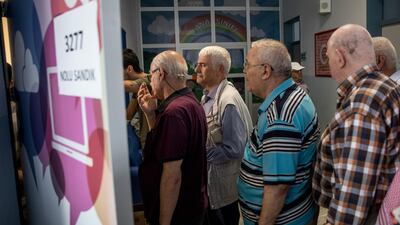Turkish voters came out in their droves on Sunday to cast ballots in an election that many see as the last chance to secure the country’s political future. In Istanbul, lines of voters streamed steadily out of the polling stations, while many stuck around to observe, sip tea and discuss the outcome of today’s critical election.
Turkey typically has a very high voter turnout, but unlike previous elections, there was hardly a person to be found didn't have an opinion and wanted to make it known.
"This is our stance, our vote – whether there is any interference by foreign or domestic powers, we are soldiers of Ataturk and we will not let the country go to the dogs," Republican People's Party (CHP) voter Esra Deniz told The National.
Many voters feel like this is the last chance for Turkey’s democracy. Last year, the country's sitting president, Recep Tayyip Erdogan, won a controversial referendum that changed Turkey from a parliamentary to presidential system. The referendum meant a series of constitutional changes that gave the executive sweeping powers, while simultaneously declawing the parliament.
"Fifty-five per cent of people do not feel relaxed because there is no democracy or justice – it's a one-man show," said Ayhan Ozturk, a retired 56-year-old and representative of the nationalist IYI Party, after he emerged from voting at a polling station.
______________
More on Turkey Election:
Turkey elections - live updates as Erdogan aims to retain presidency
Everything you need to know about the Turkish elections
Frenetic election campaign keeps pace in final day of Turkey election campaign
______________
"Twenty years ago, Turkey looked like a European country, and now we look Middle Eastern," he said. "My wife says if Erdogan wins, she won't come back here."
But Mr Erdogan still gathers significant support from his conservative base. They see him as guaranteeing the religious freedoms of the majority of Turks and laud the country's economic gains under his rule. "I'm 40 years old and I've always voted for the AKP [Erdogan's Justice and Development Party] – I lived through CHP [rule] and those were not good times, but economic times have gotten better under the AKP," Orhan Kaya, a 40-year-old jeweller from Fatih, explained.
When asked about the recent economic downturn, which has seen the lira plunge to historic lows, he shrugged. "I think the lira will go back to normal after the elections – this is a normal thing that happens every election," he said.
Who voters choose can often be predicted by the neighbourhood they live in Istanbul. In the well-heeled, elegant area of Bebek, white-collar workers streamed into the polling station to almost universally cast their votes for the secular opposition party. Another station in the majority Kurdish district of Tarlabasi welcomed almost solely HDP (People's Democratic Party) voters.
Across the Golden Horn, in the more conservative neighbourhood of Fatih, voters were more likely to choose AKP.
While one station seemed to cater solely to conservative voters, with most women wearing headscarves and men sporting beards, just 15 minutes away, another polling station hosted a more heterogeneous mix with young people who resembled Brooklyn hipsters mixing easily with the more conservative crowd.
It was at that polling station where the full array of opinions in Turkey were on display – a station manager shared confidentially that the results at this polling station have often predicted the results of the elections overall. One family of women came out proudly declaring they were voting so that “democracy would prevail”, while others voted for the AKP to preserve the economy.
Turkey is known for its deeply entrenched political blocs, which rarely breach the secular-religious divide. Liberal voters bemoan the growing authoritarian of Mr Erdogan’s Islamist-leaning AKP, while conservative voters often cite the past restrictions on religious freedoms enacted by the secular government, which long held power until the AKP became the dominant force in Turkish politics in the mid-2000s.
But those blocs are no longer monolithic – although the snap elections called in April didn’t allow much time for campaigning, Turkish voters have done a lot of thinking.
The emergence of new parties has seen people who had long stuck with the political blocs of their identity vote for newcomers. Although a long-shot, the only female candidate, former interior minister Meral Aksener stood out as a candidate who stuck to her values. She broke away from the Nationalist Movement Party (MHP), and won the support of voters who have become disillusioned with the party's politically pragmatic alliance with the ruling AKP.
Emine, 20, told The National that she became interested in Ms Aksener because female politicians have too long sat on the sidelines. "I was very upset by their rhetoric, its internal party conflicts and its flip-flopping, so when Meral Aksener broke away from the MHP, my decision was clear," she said.

